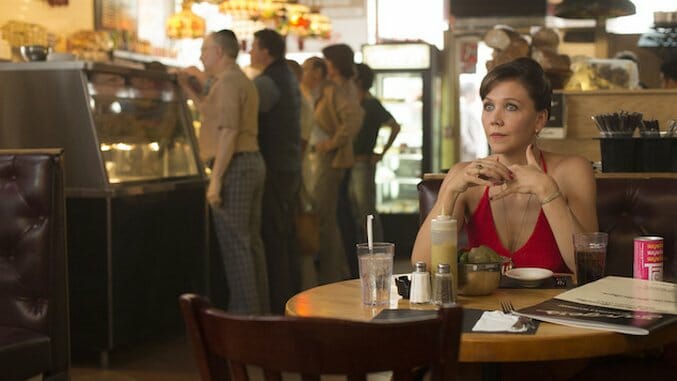The Deuce, ’70s-Set TV and the Allure of American Decline
Photo: Paul Schiraldi/HBO
The New York of The Deuce (HBO) is one long since lost, swept away to erect high-rises for stockbrokers and celebrities. Dark, smoky, seamy, rough: George Pelecanos and David Simon’s new series is set, for the most part, in dim bars and grim tenements, or on the gray, garbage-strewn streets of midtown Manhattan; the brightest sources of light are marquees for The Conformist and Mondo Trasho, or the keys and fills of low-budget film sets at the dawn of modern porn. Perhaps the definitive composition in the pilot episode finds degenerate gambler Frankie Martino (James Franco) jaywalking through traffic just south of Times Square, a murky, wide-angle image more Blade Runner than Taxi Driver—as if The Deuce were determined to thrust past and future together, two points on the plot that correspond to the same line.
That our present is The Deuce’s future begins to explain the medium’s recent fascination with the Seventies, the meaning of which remains at arm’s length. Though we continue, in many cases incorrectly, to shoehorn the Fifties, Sixties and Eighties into simpler hermeneutics—the thesis, antithesis and synthesis of postwar American political movements, as it were—the Seventies, sitting astride revolution and counter-revolution, are more difficult to gloss. In fact, the decade’s central feature in the popular imagination might be its featurelessness: “Vietnam syndrome,” “malaise” and “stagflation,” among the other associations that come with its mention, suggest convalescence, as if the country had been prescribed bed rest after a nervous collapse. As Natasha Zaretsky illustrates in her indispensable history of the period, No Direction Home, the umbrella term for this feeling of frailty is “decline”—the decline of the family, the decline of morals, the decline of military power and economic might.
Perhaps this is the flavor of the Seventies that television is after, the sickly-sweet taste of nightmares and hangovers, the fear of falling that only ends when we hit the ground and wake up. In the second season of Fargo (FX), it assumes the form of faded allusions, to Jim Jones, gas shortages, Love Canal, Pol Pot; in HBO’s Vinyl, at least before it becomes a bland portrait of excess, it comes in the shape of a buckling building, brought down by the advent of punk. In I’m Dying Up Here (Showtime), the Seventies mow down comedians’ dreams with the force of a Sunset Strip bus; The Get Down (Netflix), gluttonous, stuffs the decade to bursting; F Is for Family (Netflix) animates it with a Rust Belt homage to Archie Bunker, as if to remind us that the majority that swept Richard Nixon into office was not so silent after all. The Deuce, aided by Simon and Pelecanos’ careful world-creation, captures the sentiment best: Candy (the magnificent Maggie Gyllenhaal), the sex worker-turned-pornographer at the series’ center, even pronounces “party” like “potty,” soiling the era’s decadence the moment the word passes her lips.
That the notion of “decline” should seduce us now is no surprise: The not-so-silent minority that swept our own Nixon into office wore it on their hats. Why it’s retained its allure, its powers of persuasion, is the more complicated question, and perhaps the more telling one: The tenacity of “decline” as one of the core concepts in American life—as a lever of change, or at least change back—is proof enough that its premise is slippery, mirage-like, always appearing as we wander the desert; the “crisis of confidence” that Jimmy Carter identified is the forebear of our own.
If Fargo betrays its preference for the shallower reading of the Seventies—it accepts the era’s “malaise” as a foundational narrative, rather than submitting it to scrutiny—and Vinyl abandons its keener insights to snort the decade’s superficial symbols right up its nose, The Deuce transforms “decline” itself into its tacit subject; it holds our understanding of the Seventies up to the light, trying to unravel its mysteries. Almost Socratic in its patience, the series begins with the familiar—an attempted mugging, kids copping speed, hookers and pimps and johns and made men—only to dismantle, by degrees, the dominant narrative: It might be described as liner notes for Curtis Mayfield’s theme, ”(Don’t Worry) If There’s a Hell Below, We’re All Going to Go,” easing into the space between the verses into an attempt to pry it apart. As with The Wire, Treme and Show Me a Hero, The Deuce marshals so much of the fabric of its place and time that there’s no ironing out the wrinkles, and the result, shadowed by Vietnam, Cesar Chavez, the women’s movement and the Stonewall riots, not to mention the Knapp Commission, Mayor Lindsay, massage parlors and obscenity laws, is a wildly ambitious reinterpretation of sex and the Seventies, always casting a skeptical eye on the allure of “decline,” on its many seductions.